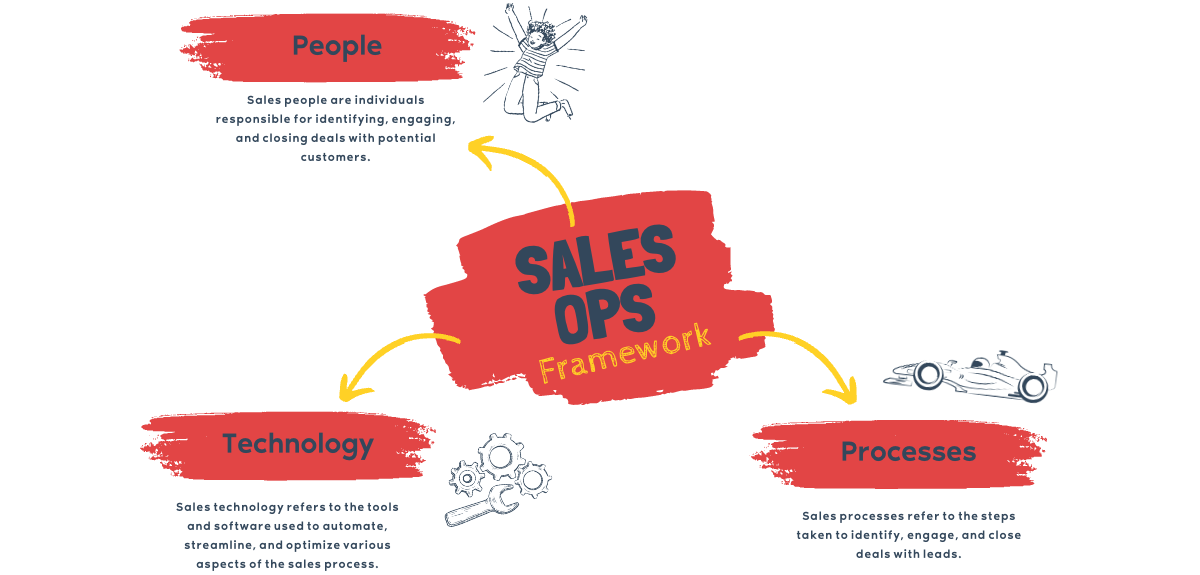What is Sales Operations (Sales Ops)?
.png?width=650&height=650&name=%23FFD126%20(11).png)
Sales Operations, also known as Sales Ops, refer to the set of activities that support the sales team in achieving their goals, including optimizing processes, enhancing productivity, and improving performance. It involves analyzing data, developing and implementing strategies, and managing technology tools to streamline the sales operational framework.
These operations are vital to Revenue Operations (RevOps) as it enables the sales team to effectively execute their role in the overall revenue strategy.
Sales Operations Framework
Sales Ops typically follows a standardized model, which includes 3 key components: processes, technology and people.
Processes
It refers to the series of steps an organization follows to close deals. These processes typically include lead management, opportunity management, sales forecasting, and performance management. Operation teams play a critical role in developing and optimizing these processes to improve the efficiency and effectiveness of the sales organization. They help to streamline workflows, reduce redundancies, and ensure that everyone is working towards the same goals.
Technology
It relates to the tools and systems that support the sales process. Sales automation tools, data analytics, customer relationship management (CRM) software, and other technologies are all critical components of the sales operations framework. Sales Ops teams are responsible for identifying and implementing the right technologies to support the sales organization. They also ensure that sales reps and managers are trained on how to use them.
People
It's the human component. refers to the individuals involved in the sales process. This includes sales reps, sales managers, and operations professionals. Operation teams are responsible for analyzing sales data, identifying areas for improvement, and developing strategies to optimize processes.

Why is Sales Operations Important?
Here are the three main reasons why Sales Ops is so important.
Performance
Sales Ops is responsible for identifying the key metrics, such as conversion rates, sales cycle length, and average deal size. By analyzing these metrics, Sales Operations can identify areas for improvement and develop strategies to optimize its performance.
Productivity
Sales Ops is also responsible for streamlining processes and removing obstacles that may impede sales productivity. This includes identifying and addressing bottlenecks in the processes, automating administrative tasks, and implementing best practices to improve commercial efficiency.
Process Improvement
Sales Operations plays a critical role in driving continuous improvement in the sales process. By analyzing data and feedback from reps, it can identify areas for improvement and develop optimization strategies. This may involve revising methodologies, improving training programs, or implementing new tools and technologies.
Sales Operations Roles
These roles involve managing the sales processes, including data analysis, forecasting, and lead management. These are some of the most impactful roles.
Sales Operations Specialists
These specialists are responsible for managing specific areas of the processes. They work closely with other members of the sales team to optimize processes and improve performance.

Sales Operations Analyst
This role is responsible for analyzing sales data and identifying key metrics to improve performance. They work closely with sales managers to develop strategies to enhance productivity and optimize the processes.
Sales Operations Manager
These are responsible for overseeing the sales operations team and ensuring that the processes are optimized for maximum effectiveness. They work closely with other members of the sales organization, including sales managers and reps, to ensure that goals are met.
Sales Operations Processes
As briefly mentioned at the beginning, these processes are a crucial part of any successful sales team. It encompasses several key areas, including forecasting, deal stages and sales pipelines analysis, lead management, and overall data analysis.
Sales Forecasting
Forecasting is an important part of Sales Operations, as it allows sales teams to predict future deals and revenue. This process involves analyzing historical data, market trends, and other relevant factors to create accurate forecasts. Operations teams also work closely with managers and reps to develop forecasts even more realistic.
Deal Stages Analysis
Deal stages refer to the specific point in the sales process at which a lead is currently located. Reps use these insights to determine what actions need to be taken to move the deal forward. By analyzing deal stage data, Sales Ops teams can identify patterns and trends that help them optimize their revenue flow.

Sales Pipeline Analysis
This analysis involves tracking the progress of potential deals through the sales pipeline. This includes identifying bottlenecks and areas where deals tend to get stuck. Sales operations teams use these analysis to develop strategies that help move deals through the pipeline more efficiently. They also use pipeline analysis to identify potential issues early on and take corrective action before they become major problems.
Lead Management
This is the process of capturing, tracking, and managing leads throughout the sales process. Sales Ops teams help to design and implement effective strategies, including lead qualification, lead nurturing, and lead scoring. This helps to ensure that leads are properly managed and that reps are able to focus on the most promising opportunities.
Sales Data Analysis
It’s a critical part of the sales operations process, as it allows teams to identify trends, opportunities, and areas for improvement. This involves analyzing sales data from various sources, including CRM systems, and customer interactions. Operations teams use this data to make informed decisions about strategies, processes, and tactics.
Yes, RevOps is much more than theory.
Check out RevOps Case Studies!!!
Get inspired to take your Revenue Growth to the next level.

Sales Enablement and Sales Ops
Sales enablement is closely related to sales ops, as both functions aim to improve the effectiveness and efficiency of the sales team. Operation teams work to optimize processes and systems, while enablement teams focus on providing the sales team with the tools and resources they need to sell more effectively. Together, these two functions can help create a more effective and efficient sales organization.
Sales Ops and Tech Stack
Sales Automation Tools
One of the primary functions of sales ops is to automate repetitive tasks that consume a significant amount of time for reps, allowing them to focus more on selling. Automation tools are crucial in achieving this goal. They help to streamline the processes by automating repetitive tasks such as data entry, lead prioritization, and follow-up emails. They also provide real-time insights into the sales process, enabling reps to make data-driven decisions.
Other Sales Tools
In addition to automation tools, there are other tools that operations professionals use to improve sales productivity and effectiveness. For example, CRM software provides a centralized database of customer information and interactions, making it easier for reps to manage leads, contacts, and deals. Sales engagement platforms enable reps to create personalized outreach sequences and automate follow-up tasks, increasing efficiency and effectiveness. Other tools include sales enablement software, which helps reps to access and share relevant content with prospects and customers, and sales analytics tools, which provide insights into sales performance and customer behavior.
Sales Operations Tools
Sales operations professionals also use specialized tools to manage and optimize their processes. These tools include sales forecasting software, which helps to predict future revenue based on historical data and current trends. Sales territory management software helps to optimize areas based on factors such as customer density and potential revenue. Data analytics tools enable operations teams to analyze sales data and identify trends and opportunities for improvement.

Best Practices for Sales Operations
Sales operations is a crucial function for any sales team, and there are several best practices that can help ensure its success. Here are some key practices to consider.
Key Metrics
Tracking the right metrics is crucial for identifying areas where sales operations can improve. Some key metrics to track include:
- Sales cycle length. The length of time it takes to close a deal from initial contact to close. Shorter cycles typically indicate that Sales Ops are working effectively.
- Sales productivity. The amount of revenue generated by each sales rep or team. This metric can help Sales Operations identify which ones need additional support and coaching.
- Lead conversion rate. The percentage of leads that turn into paying customers. Sales Operations can use this metric to evaluate the effectiveness of lead management processes.
- Sales forecast accuracy. The accuracy of sales forecasts, which can help Operations managers make informed decisions about resource allocation and goal-setting.
- Sales pipeline coverage. The ratio of pipeline value to sales target. This metric can help Sales Operations identify potential pipeline gaps and take action to address them.
- Sales rep performance. The overall performance of sales reps, measured by factors such as quota attainment and activity levels. Sales Ops can use this metric to identify which reps need additional support and coaching.
- Sales enablement effectiveness. It measures enablement programs and resources, through factors such as adoption rates and usage.
- Sales process efficiency. The efficiency of the sales process, measured by factors such as deal velocity and win rate. This metric can help Sales Ops identify areas for process improvement.
- Customer acquisition cost (CAC). Sales Operations can use this metric to evaluate the effectiveness of marketing and sales efforts.
- Sales funnel conversion rate. The percentage of opportunities that move from one stage of the sales funnel to the next. This metric can help Sales Ops identify which stages of the funnel need improvement.
- Sales pipeline velocity. The speed at which deals move through the sales pipeline. Sales Operations can use this metric to identify bottlenecks in the processes and take action to improve efficiency.
- Sales cycle efficiency. The efficiency of the sales cycle, measured by factors such as the number of touches required to close a deal and the time spent on administrative tasks.
- Customer lifetime value (CLTV). Sales Ops can use this metric to evaluate the effectiveness of customer retention efforts.
- Sales technology adoption rate. The percentage of sales reps who are using sales technology tools such as CRM systems, sales enablement platforms, and sales automation tools.
- Sales team quota attainment. The percentage of the sales team that achieves their quota. This metric can help Sales Ops identify which reps or territories may need additional support.
Average Sales Cycle Length
Reducing the sales cycle length is a critical factor for boosting performance. By analyzing the processes, identifying bottlenecks, operations can help reduce the time it takes to close deals.
Sales Goals
Sales goals should be aligned with the company's overall goals and revenue targets. By setting realistic and achievable goals, sales ops can motivate the sales team and help them focus on the most important activities.
Coach Sales Managers
Managers play a vital role in sales ops, and they should receive regular coaching and training to help them improve their performance. The operations team can help identify areas where sales managers can improve and provide the necessary support to help them succeed.

Sales Operations vs. Sales Teams
Sales Operations and Sales Organization are two important aspects of a company. It is essential to understand the differences between the two in order to obtain the desired results.
The sales department is responsible for generating revenue by selling products or services. The sales operations, on the other hand, is responsible for managing and optimizing the sales process. While the first focuses on selling, the second looks at the processes that support the sale.
The operations team works behind the scenes to ensure the sales team can do their job effectively. They analyze data, create reports, and implement strategies to improve the sales process. Sales team members are focused on selling and may not have the time or expertise to handle the administrative and analytical tasks necessary for optimizing the sales processes.
It's important to note that the operations team is not a replacement for the sales team. They work together to achieve the same goal - generating revenue for the company. By working in tandem, the sales team can focus on selling while the operations team focuses on optimizing the sales process to increase revenue.
Sales Operations and Sales Cycles
Sales Funnel and Flywheel
The sales funnel and the flywheel are two popular frameworks used in sales and marketing to guide the customer journey. While they both aim to help businesses attract, engage, and retain customers, there are some key differences between the two.
The sales funnel is a linear model that represents the steps a potential customer goes through on the path to making a purchase. The stages of the funnel typically include awareness, interest, consideration, and purchase. In the traditional sales funnel model, the focus is on driving customers down the funnel towards a sale.
The flywheel (a concept that has been popularized by HubSpot), on the other hand, is a circular model that focuses on creating a positive customer experience that leads to sustained growth over time. The three stages of the flywheel - attract, engage, and delight - are interconnected and ongoing, with each stage building momentum for the others.
One key difference between the sales funnel and the flywheel is that the sales funnel tends to focus on acquiring new customers, while the flywheel emphasizes the importance of customer retention and referral. The sales funnel is a more transactional model, while the flywheel is a more relationship-focused model.
Another key difference between the two is the role of sales operations. In the sales funnel model, operations teams are typically focused on optimizing the sales process and maximizing conversion rates. In the flywheel model, these teams are responsible for analyzing data, identifying areas for improvement, and optimizing each stage of the flywheel to create a positive customer experience and drive growth over time.
Ultimately, both can be effective frameworks for businesses looking to attract, engage, and retain customers. The choice of which to use will depend on a business's unique needs and goals. While the sales funnel is a tried-and-true approach, the flywheel offers a more holistic view of the customer journey and has become increasingly popular in recent years.

Sales Methodologies
Operations teams also work closely with sales reps to implement and optimize sales methodologies. These methodologies are designed to help reps understand the customer's buying process and navigate it effectively. Operations teams use data analysis and sales enablement tools to identify the most effective methodologies for their business.
How Sales Operations Works
Operations teams undertake various tasks and activities to support the sales team. Here are some of the ways that they work.
Administrative Tasks
Operations teams handle a range of administrative tasks that are critical to the success of the sales team. These include managing and updating the customer relationship management (CRM) system, creating and managing reports, managing the team's calendars, and handling team communication. Operations teams also manage sales team expenses, track its performance, and provide support to members as needed.
Sales Activities
Operations teams work with the sales team to help them manage their daily activities. This includes assisting with lead generation, lead qualification, and lead nurturing. Sales ops teams also help to manage the deals to move leads through the pipelines.
Support Sales Reps
Operations teams provide critical support to reps to help them be more effective. This includes providing training and coaching, developing and maintaining tools, and assisting with the development of messaging and positioning. Sales operations teams also work with reps to help them understand leads needs, develop sales strategies, and manage sales objections.
Conclusion
Understanding what is sales operations is crucial to the success of any sales team. It involves a diverse range of activities, such as lead management, forecasting, sales enablement, and process enhancement. To develop a thriving sales team, businesses must prioritize optimizing their operational structure, providing their reps with the necessary tools and processes for success. This includes implementing technology and providing sales training and coaching. Furthermore, sales operations teams must be flexible and capable of responding to market and customer changes, continually enhancing their processes, and staying current with the latest sales tools and technologies. By doing so, sales operations can facilitate growth and success for their organizations.
Yes, RevOps is much more than theory.
Check out RevOps Case Studies!!!
Get inspired to take your Revenue Growth to the next level.
